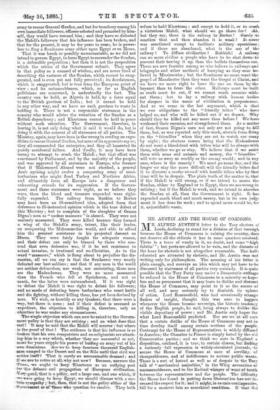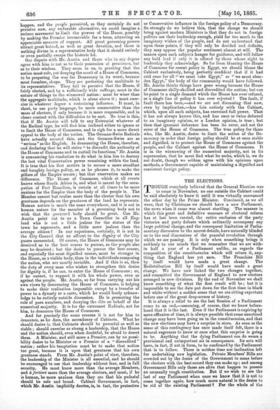MR. AUSTIN AND THE HOUSE OF COMMONS.
W. ALFRED AUSTIN'S letter to the Tory electors of Leeds, declining to-stand for a division of that borough because the House of -Commons is ruining the country, does not deserve alLthe ridicule it has in some quarters received. 'There is a trace of -vanity in it, no doubt, and some "-high faIntin' "; batpoets are allowed to be vain, and the distaiste, of the hour for-rhetoric is not altogether reasonable. The halfeducated are attracted by rhetoric, and 'Mr. Austin was 'not -writing only for philosophers. 'The meaning of his letter is plain enough, and -conveys an idea which may yet have to--be discussed by statesmen of all parties very seriously. It is quite possible that the Tory Party may under a Democraticettffrage be reduced in the 'House of Commons to a minority so -hopeless and-so permanent-that it-may learn to dislike and distrust the -House of Commons, may point to it as the source -'of all evil, and may seriously try to diminish its 'sphere of action. Lord Beaconsfield, who had occasionally strange flashes -of ,insight, thought 'this was sure to happen whenever the House became sovereign, the historic tendency of the English people, he said, being always to dislike -the visible depositary of power ; and Mr. Austin -only-hopes for -what Lord 'Beaconsfield predicted. Nor are we at -all -sure that a certain dislike of the.House of Commons may motin time develop itself among certain sections of the 'people. Contempt for the 'House of Representatives is widely diffused -in America; the 'Chamber in-France is simply hated by -the. GM 'Conservative 'parties; and -we think -we note in -England a disposition, confined, it is true,-to certain classes, hut firiding a curiously expression in -widely-circulated journals, "to accuse the House of Commons at once of servility, .of changeableness, and -of indifference to serious public -.wants. 'There is a sort of hatred as well as of despair in 'the Tory talk of "mechanical majorities," in the Whig .accnsation-rof unreasonableness, and-in the Radical-whisper of.wanttetcmth -between' the representatives and the -people. 'The dffliettity • the House has found in ;putting down Obstruction -has mot increased-the respect for it; and it might, in certain contingencies, fall for a moment into an anarchical.00ndition. If that .ffid happen, and the people perceived, as they certainly do not perceive now, any endurable alternative, we could imagine a serious movement to limit the powers of the House, possibly by making the Premier irremovable for a term, attracting an appreciable measure of support. All great governing powers attract great hatred, as well as great devotion, and there is nothing divine in a representative body that it should entirely or even partially escape the historic lot. Our dispute with Mr. Austin and those who in any degree agree with him is not as to their possession of prescience, but as to their wisdom. They seem to us, in granting that the nation must rule, yet denying the merit of a House of Commons, to be preparing the way for Democracy in its worst, because most formless, shape. They are preferring the multitude to its representatives. They fail to perceive that the House, if fairly elected, and by a sufficiently wide suffrage, must in the nature of things be the winnowed nation ; must be wiser than the aggregate multitude, which is alone above it ; must exercise in whatever degree a restraining influence. It must, in short, to use party language, be more conservative than the mass of electors, if only because it is more responsible, and in closer contact with the difficulties to be met. So true is this, that if Mr. Austin will talk to any Extremist whatever of the Radical type, he will find him inclined either to ignore or to limit the House of Commons, and to sigh for a more direct appeal to the body of the nation. The German-Swiss Radicals have actually secured this, and the German-Swiss are as "serious" as the English. In denouncing the House, therefore, and declaring that he will strive "to discredit the authority of the House of Commons and to curtail its functions," Mr. Austin is announcing his resolution to do what in him lies to destroy the last vital Conservative power remaining within the land. It is true that his first motive is to secure a more steadfast and haughty foreign policy, or, as he phrases it, to make the pillars .of the Empire secure ; but that reservation makes no difference. The House of Commons, which at all events knows where South Africa is, and what is meant by the occupation of Port Hamilton, is certain at all times to be more anxious for the Empire than the body of the people is. The Member cannot but realise more than the elector that his own greatness depends on the greatness of the land he represents. Human nature is much the same everywhere, and it is not in human nature for the member of a governing body not to wish that the governed body should be great. Can Mr. Austin point out to us a Town Councillor in all England who is not a little jealous for the status of the town he represents, and a little more jealous than the average citizen ? In our experience, certainly, it is not in the City Council that an affront to the dignity of the City passes unresented. Of course, the House of Commons may be deceived as to the best course to pursue, as the people also may be deceived ; but the desire to pursue the best course, and especially the most dignified course, must be stronger in the House, as a visible body, than in the individuals composing the nation, who are mostly invisible. And if this is so, then the duty of every man who wishes to strengthen this desire for dignity is, if he can, to enter the House of Commons ; or, if he cannot, to support it with his whole power, even as against the people. Mr. Austin, so far from carrying out his own views by denouncing the House of Commons, is helping to make their realisation impossible except by a transfer of power to a dynasty or a caste, which he would freely acknowledge to be entirely outside discussion. He is promoting the rule of pure numbers, and decrying the elite on behalf of the numerical majority. It is for the extremest Radicals, not for him, to denounce the House of Commons.
And for precisely the same reasons it is not for him to denounce, as he does, the ascendancy of Cabinets. What he should desire is, that Cabinets should be powerful as well as stable ; should exercise so strong a leadership, that the House and the nation should, even when doubtful, be afraid to desert them. A Minister, and still more a Premier, can by no possibility desire to be Minister or a Premier of a "discredited " nation ; rather his temptation must be to make that nation too great, because it is upon that greatness that his own greatness stands. From Mr. Austin's point of view, therefore, the leadership of the Minister is all essential, and he should be encouraged to use that leadership without fear, and in full security. He must know more than the average Members, and a fortiori more than the average electors, and must, if he is human, be more anxious than they are that his pedestal should be safe and broad. Cabinet Government, in fact, which Mr. Austin implicitly decries, is, in fact, the protective or Conservative influence in the foreign policy of a Democracy. So strongly do we believe this, that the charge we should bring against modern Ministers is that they do not in foreign politics use their leadership enough, yield far too much to the imaginary wishes of the people, and do not understand that upon these points, if they will only be decided and definite, they may oppose the popular sentiment almost at will. The masses upon such subjects hunger for guidance, and will follow any bold lead if only it is offered by those whose right to leadership they acknowledge. So far from blaming the House of Commons for recent policy in Egypt, we should blame the Cabinet exclusively, being perfectly confident that if it had said once for all " we must take Egypt," or "we must abandon Egypt," the body of the community would have followed. Mr. Austin thinks things have gone wrong because the House of Commons shilly-shallied and discredited the nation; but can he point to a single demand which the House has ever refused, or a single line of policy it has ever rejected ? The fault, if fault there has been,—and we are not discussing that now, even by implication,—has lain entirely with the Cabinet, which, upon all such subjects, has exercised full power. That it has not always known this, and has once or twice deferred to an imaginary opinion, or a London opinion, is true ; but then that ignorant deference has been its error, and not the error of the House of Commons. The true policy for those who, like Mr. Austin, desire to limit the action of the Democracy in order that foreign policy should be at once stable and dignified, is to protect the House of Commons against the people, and the Cabinet against the House of Commons. It is in the winnowing of the numerical majority, not in its supersession, that he must find what he seeks, which is, we do not doubt, though we seldom agree with his opinions upon methods, a Government capable of maintaining a dignified and consistent foreign policy.



































 Previous page
Previous page